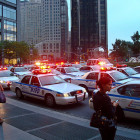
United States Will Stop Deporting Young Undocumented Immigrants Under New Policy
|
The Obama administration will no longer deport and begin granting work permits to young undocumented immigrants who came to the United States as children, The New York Times reports. The policy change does not need Congressional approval. President Obama will discuss the plan at a press conference in the Rose Garden Friday afternoon. The policy change could affect some 800,000 immigrants who are younger than 30 and arrived in the United States before they turned 16, according to The Times. Additionally, they must have been in the country for at least five continuous years, have a high school diploma or GED earned in the United States, served in the military or have no criminal history.











